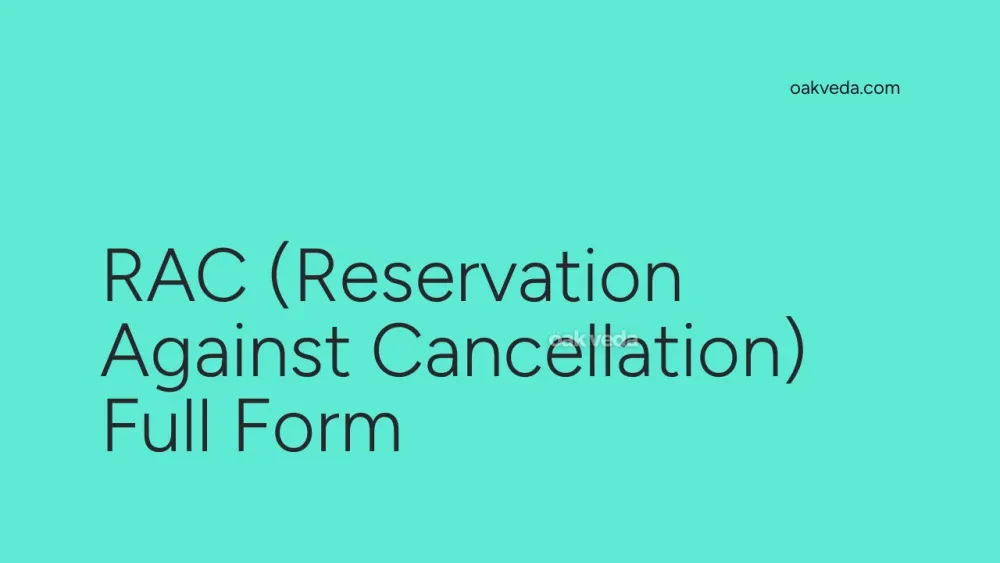
What is the Full Form of RAC?
RAC is the abbreviation for Reservation Against Cancellation, a term commonly used in the Indian Railways booking system. This unique ticketing option provides passengers with a conditional reservation, offering a middle ground between confirmed tickets and waitlisted ones.
What is Reservation Against Cancellation?
Reservation Against Cancellation is a ticketing status that allows passengers to board a train even when all seats are initially booked. It's a system designed to maximize seat utilization and provide more travel opportunities for passengers.
Origin and Development of RAC
The RAC system was introduced by Indian Railways to address the high demand for train tickets, especially during peak travel seasons. It has evolved over the years, becoming an integral part of the railway reservation process and helping to manage the complex task of allocating limited seats to a large number of travelers.
How does RAC work?
When a passenger books an RAC ticket, they are essentially placed in a queue for a full seat or berth. Here's how the process typically unfolds:
- Passengers with RAC status are allowed to board the train.
- They are initially allocated a shared seat (two RAC ticket holders share one berth).
- As cancellations occur or no-shows are identified, RAC ticket holders may be upgraded to full seats or berths.
- The Train Ticket Examiner (TTE) manages this process during the journey.
Functions of RAC
The RAC system serves several important functions in the Indian Railways:
- Optimizes seat utilization: By allowing more passengers to travel, it ensures that cancellations don't result in empty seats.
- Increases booking flexibility: Passengers have a higher chance of traveling on their preferred date.
- Manages overbooking: It's a systematic way to handle the common practice of overbooking in transportation.
- Improves customer satisfaction: More passengers can travel, even if not with full comfort initially.
Applications of RAC
RAC is primarily used in long-distance train travel across India. It's particularly useful in the following scenarios:
- During peak travel seasons when demand far exceeds available seats
- For popular routes where getting a confirmed ticket is challenging
- When passengers need to travel on specific dates despite full bookings
Features of RAC
- Shared seating: Initially, two RAC ticket holders share one berth.
- Boarding rights: RAC ticket holders can board the train, unlike those on the waiting list.
- Upgrade potential: Possibility of getting a full berth during the journey.
- Refund policy: Lower cancellation charges compared to confirmed tickets.
Benefits of RAC
- Guaranteed travel: Unlike waitlisted tickets, RAC ensures you can board the train.
- Flexibility: Higher chances of traveling on your preferred date.
- Cost-effective: Full refund possible if cancelled before chart preparation.
- Upgrade possibility: Chance of getting a full berth if there are cancellations.
Limitations or Challenges of RAC
While RAC offers several advantages, it also comes with some limitations:
- Shared accommodation: Initially, you might have to share a berth.
- Uncertainty: Full berth availability is not guaranteed.
- Full fare payment: Despite shared accommodation, you pay for a full ticket.
- Time-bound cancellation: Refund rules are stricter than for waitlisted tickets.
Future Developments in RAC Technology
Indian Railways continually works on improving its reservation systems. Future developments may include:
- Real-time updates: Instant notifications about status changes via mobile apps.
- AI-powered allocation: Using artificial intelligence to optimize seat allocation.
- Integration with other transport modes: Seamless booking across different transportation types.
FAQs on RAC Full Form
-
Can I board the train with an RAC ticket? Yes, passengers with RAC tickets are allowed to board the train.
-
How is an RAC berth allocated? Initially, two RAC ticket holders share one berth. As cancellations occur, they may be upgraded to full berths.
-
What are the chances of getting a confirmed seat with RAC? Chances vary depending on the route, season, and cancellations. Many RAC tickets do get confirmed before or during the journey.
-
Is RAC better than a waitlist ticket? Generally, yes. RAC guarantees boarding, while waitlisted passengers cannot board unless their ticket is confirmed.
-
Can I cancel an RAC ticket? Yes, RAC tickets can be cancelled. The refund amount depends on how early you cancel before the journey date.
-
How can I check my RAC status? You can check your RAC status online on the IRCTC website, through the IRCTC mobile app, or by calling the railway enquiry number.
-
Do I need to pay extra for an RAC ticket? No, you pay the full fare for an RAC ticket, the same as a confirmed ticket.
-
Can I choose my RAC berth? No, RAC berths are allocated by the system and can be changed by the TTE during the journey.
In conclusion, understanding the full form of RAC - Reservation Against Cancellation - is crucial for anyone traveling by Indian Railways. While it comes with some limitations, RAC offers a valuable middle ground between confirmed and waitlisted tickets, increasing the chances of travel for millions of passengers across India.
You may be interested in:

